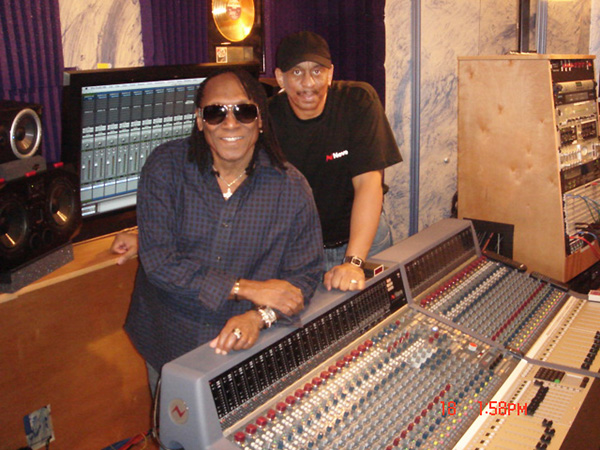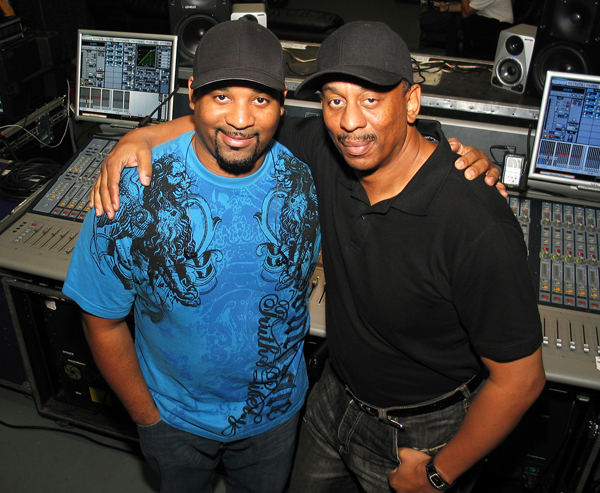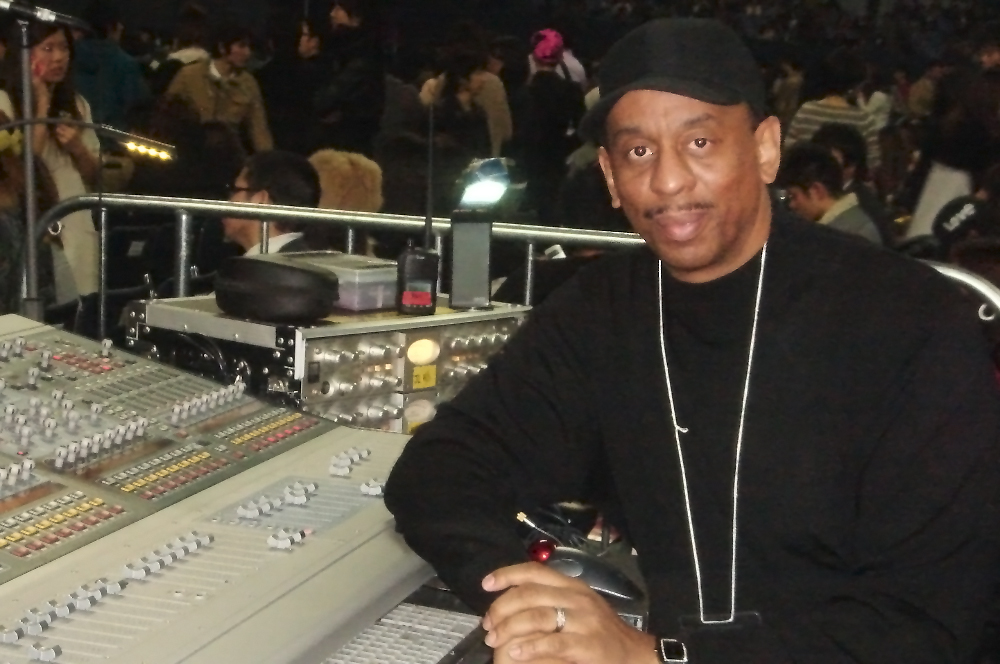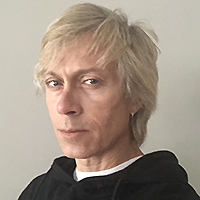Asked what quality he brings to the job that attracts so many A-list clients, Rick Camp notes with a laugh, “It’s being able to come up with a good mix fast.”
But he quickly follows that every situation presents unique challenges with examples: “With Jennifer (Lopez), it was a 50-foot thrust going out into the middle of the audience that the PA was just blazing on. She sang some songs on a headset microphone and it was a bit of a challenge to get that mic over the band and keep the band pumping. With Earth Wind & Fire, they were used to hearing their vocals hitting the back of the arena. If they couldn’t actually hear their vocals bounce back to the stage, they felt like they weren’t loud enough.”
And with Burt Bacharach, Camp continues, the quest was ensuring a mix meeting the venerable artist’s stringent standards. “He has very sensitive hearing and could tell, from the stage, when one violin was out of tune or one section was too loud in the mix and he’d be like, ‘Rick, the viola’s too loud’.”
Changing Times
Born and raised in Cincinnati, Camp excelled as a trumpet player in high school and then moved on to the Berklee College of Music in Boston. That was in 1980, a time when pop musical styles were transitioning to more of a reliance on synthesizers and bands were getting smaller. Both meant that the artists he grew up listening to – Earth Wind & Fire, Chicago, and Tower of Power – were becoming less influential.
“I saw what was going on and it was like, ‘You know what, horn players are going to be out of work here, real fast.’ If I wanted to be in the music business, I knew I needed to do something else. I always did sound for the bands I played with, and it just came naturally to me.”
Ultimately the move from the stage to the console provided him with more opportunities to be creative than he would have had as a horn player. “But I never went to school for audio,” he adds. “I taught myself by working with local bands and sound companies and reading. I also read a lot of books and called up manufacturers like SSL, Neve, and Midas to get the manuals for their consoles.”
Camp began his touring sound career in 1987 while working for Cincinnati’s Festival Audio on the national Miller Sound Express Tour. Mixing a local band that opened for popular West Coast based R&B artists The Whispers led to meeting the production manager and FOH engineer, Michael Carter, an association that would prove to help take his career to the next level.

The two stayed in touch following the tour, and the following year when Carter needed a last-minute replacement to mix The Whispers at a gig in Delaware, he reached out to Camp. He went on to mix the group for the next 12 years, and by 1988 relocated to Los Angeles.
“That’s where they were based and there were more opportunities in LA,” he explains. “I couldn’t have done what I’m doing if I’d have stayed in Cincinnati. I never would have met the people I’ve met.”
Once there, one gig led to the next, keeping him busy, and he eventually signed on with Earth Wind & Fire during the band’s resurgence in the mid-90s. He’d been working as both a house and monitor mixer, but the work with EWF put him at FOH almost exclusively, with the exception of occasional monitor roles with the likes of Whitney Houston and Stevie Wonder.
By the late 90s, he was manning the desk for some of the top touring artists in the world, including Madonna and Destiny’s Child, as well as that latter’s lead performer Beyoncé when she went solo. And Camp continues his association with Carter to this day. crediting him with helping foster mix gigs with Chris Brown, Mary J. Blige and a variety of other high-profile performers.
New Directions
Studio work has always been part of the equation as well. Early on, he recorded local bands in Ohio and then took an engineering gig at Troutman Sound Labs in Dayton. “I learned a lot of my studio chops from Roger Troutman,” he says. “That was a major milestone in my career.”
Over the past 12 years, Camp has also operated his own studio, a facility he originally worked at as an engineer for two years before taking it over from previous owner Walter Orange of the Commodores. “I actually ended up buying his house and his studio in Los Angeles,” he says, adding that he moved the studio to Summerlin, a suburb of Vegas, when he relocated to Nevada 10 years ago.
It’s enough to keep anyone busy, but in June of last year, Camp increased his workload substantially by opening Master Mix Live, a dedicated school that offers an hands-on, 20-week program aimed at preparing students for a career in professional audio. Students learn basic electrical principles, rigging practices, and mix techniques. They work with live bands as well as multi-track recordings of shows Camp has mixed, and intern at local casino showrooms and sound companies.
“We start from the beginning and build. I talk about etiquette, because before you get to mix a Beyoncé, you’ve got to know how to deal with the politics of mixing a Beyoncé, so I talk about the business, how it operates, the do’s and the don’ts,” he notes, adding that the program is wholly dedicated to audio.
“A lot of kids go to schools where they’re in a class with 30 people and never touch a console,” he adds. “They take video, lighting and everything else under the sun, but just a bit of audio. I only have eight students at a time because I want to make sure that they really know what they’re doing and can get a job.”
Establishing Master Mix Live is an expression of Camp’s long-standing commitment to sharing his knowledge of the art and science of sound with others. “I’ve always taught people as I go. and never have a problem showing them what I know or how to do something.” The idea for a formal program eventually came to him: “It’s been a work in progress for probably about 10 years, but in the last three years I got serious about putting it together.”
Camp is currently finishing up mixes for an upcoming Jennifer Lopez DVD, recorded in 2012 in Lisbon, Portugal, and is also working on a project that requires his skills as a live and studio engineer: a reworking of the Bally’s Casino production of “Jubilee,” a classic Vegas revue that’s been running for 32 years.
“The last time they did something to freshen up the show was about 20 years ago,” he notes. “I’m restoring and remixing it in 5.1 surround, and adding music for the new production that opens in March.” The final stage in revitalizing these tracks, which were originally recorded with a 60-piece orchestra, is a final mix in the theatre itself to optimize the sound for the venue.
Family Matters
Both of the recent projects have Camp working again with musical director Kimberly Burse, who also brought him onboard with Beyoncé. And to handle monitor mixing for a portion of the superstar performer’s recent tours, she chose a talented audio professional in his own right, Noel Edwards, who is Camp’s 31-year-old son.
In high school, Noel was an aspiring basketball player who unfortunately severely injured a knee on the football field. “The next thing I knew, he was asking me questions about audio,” Camp relates. “By his senior year, he was mixing at clubs, and I actually sent him out on a one-off gig with Lil’ Kim when he was still in high school. And he’s done a lot on his own, working with Rat Sound, Delicate Productions, and a mega church in LA.”

It was family that prompted Camp’s move to Nevada in the first place, the desire to settle down with his Las Vegas-based wife, Jorina, whom he met while touring with Beyoncé. “She’s an actress and model, and was actually Beyonce’s stand-in for camera blocking at an awards show.” They’ve been together 10 years, and in addition to Noel, he also has three adult daughters by way of an earlier marriage.
Camp says he’s trying to slow down a bit and spend more time at home, but even so, keeps up a pace that might wear out far younger folks. “I don’t know,” he concludes, laughing.
“I’ve just had that work ethic since I was a kid. I just go at it and get it done. I guess it’s from my grandfather, who owned his own refrigeration business. I grew up watching him do his own thing every day, getting up and going to work. I guess that’s where the entrepreneurial spirit comes from.”















